Share
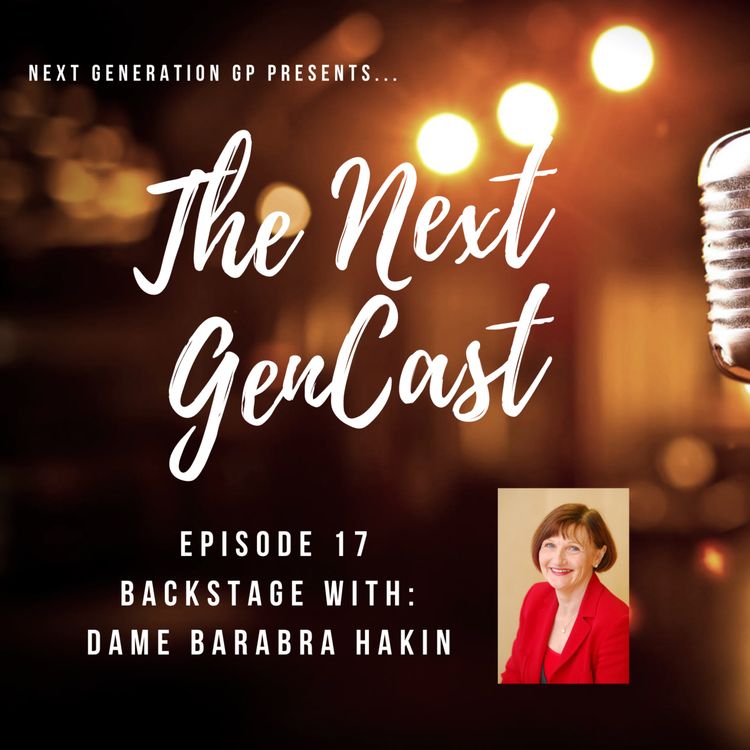
The Next GenCast
Episode 17. Backstage with: Dame Barbara Hakin
Dame Barbara Hakin’s immense personal contribution to the NHS has spanned four decades – as a clinician, manager and national leader.
During her long career she has worked as a GP for 20 years before taking up her first management role in the NHS, first as a Primary Care Trust Chief Executive in Bradford and then as a Strategic Health Authority Chief Executive in the East Midlands.
She went on to become National Director of Commissioning Operations and Deputy Chief Executive at NHS England, where she helped oversee the establishment of CCGs. Described as Sir David Nicholson’s right-hand woman and a forthright and skilled operator, she has often been depicted as the most influential woman in the NHS during her time there.
In this conversation Barbara provides a fascinating overview of how primary care has evolved over time, as well as advice on leading effectively as the shortest person in most rooms, whether clinical credibility matters, and influencing politicians.
Side note: Given the number of three letter acronyms mentioned, you might find this historical overview and this one useful to look at alongside the conversation. The King's Fund also has some great animations and explainers which might help. Please see a summary of the terms she mentions below too in case it's helpful.
*Highlights:
- Her early journey (3 mins)
- Work life balance (6 mins)
- Remaining a doctor and being in management roles (10 mins)
- Her first experiences of NHS management (16 mins)
- Being an influencer (21 mins)
- Having presence and making your voice heard (24 mins)
- Journey to helping to set up NHS England (28 mins)
- Imposter syndrome (33 mins)
- The Health and Social Care Act, and Andrew Lansley (34 mins)
- Advice on working with politicians (38 mins)
- Her favourite health minister (41 mins)
- Her view on integrated care systems and the trajectory of primary care (42.5 mins)
- Future challenges for primary care post-Covid (48 mins)
- Final 3 questions - a leader, a book, and top tips (51 mins)
*Social media:
*Subscribe to the Next Gen GP monthly bulletin to keep in the loop about future webinars, podcast episodes, and our virtual programmes:
*EXTRAS
========
Here are some explanations of the terms Dame Hakin uses:
Commissioning: the process by which health and care services are planned, purchased and monitored.
Fundholding: In 1991, the Conservatives introduced the purchaser/provider split. Health authorities began to commission (buy) care, and GP fundholding was introduced. Under GP fundholding, GPs held real budgets with which they purchased primarily non-urgent elective and community care for patients; they had the right to keep any savings and had the freedom to deliver new services. Fundholding was not compulsory and applicants initially had to meet a number of criteria to enter into the scheme. Smaller practices could group together to form fundholding consortia.
PCGs and PCTs: Fundholding and family health authorities were replaced in 1999 with 481 primary care groups (PCGs). In 2000 the government announced that PCGs would become primary care trusts (PCTs). PCTs were managed by a team of executive directors headed by a chief executive.
PEC: Other board members of the PCT included the chair of the professional executive committee (PEC). This was elected from local GPs, community nurses, pharmacists. Broadly speaking, PECs provided a clinical viewpoint on the strategy and operations of the PCT.
SHA: In 2002, groups of health authorities were formed called Strategic Health Authorities (SHAs). These were responsible for developing and improving health services in their local area, ensuring quality, measuring performance, and making sure that national priorities were integrated into local plans.
2012 Health and Social Care Act: In 2012, the 10 SHAs and the 152 Primary Care Trusts which looked after services at a local level, were replaced by NHS England and more than 200 Clinical Commissioning Groups. The proposals were primarily the result of policies of the then Secretary of State for Health, Andrew Lansley
ICS: These Integrated care systems (ICSs) are a key part of the NHS long-term plan, and are intended to bring about major changes in how health and care services are planned, paid for and delivered.
ICSs are partnerships that bring together providers and commissioners of NHS services across a geographical area with local authorities and other local partners, to collectively plan and integrate care to meet the needs of their population. In November 2020, NHS England and NHS Improvement published Integrating care: next steps to building strong and effective integrated care systems across England, which Barbara references towards the end of the podcast.
More episodes
View all episodes

Episode 52: Backstage with Sabrina Cohen-Hatton, Chief Fire Officer
58:20|From sleeping rough at 15 to becoming one of the UK’s youngest female Chief Fire Officers, Sabrina Cohen-Hatton’s story is extraordinary- but this episode goes far beyond inspiration.This is a masterclass in high-stakes leadership, cognitive bias, psychological safety, and refusing to let your childhood define your ceiling.We explore what it really means to lead when decisions carry life-or-death consequences - and why the most powerful leadership lessons often come from outside healthcare.If you care about resilience, systems thinking, and building braver organisations, this conversation is unmissable.⏱ What we cover04:00 – Growing up, early trauma, and becoming homeless at 1509:00 – Survival mode: what rough sleeping really does to your mindset14:00 – “Homelessness is an experience, not your identity”20:00 – Joining the fire service and choosing a different future27:00 – Decision-making under extreme pressure33:00 – Cognitive bias in high-stakes environments41:00 – Psychological safety: why it’s built in relationships, not policy49:00 – Failure, imposter syndrome, and redesigning systems instead of blaming people🌍 Connect with Sabrina Cohen-Hatton on social media to follow her work and leadership journey.🔔 Follow Next GenGP on LinkedIn for leadership insights and episode updates.📩 Subscribe to our monthly bulletin for exclusive leadership resources and updates on programmes to come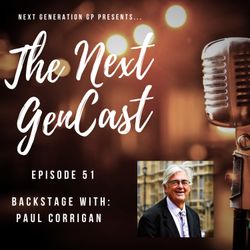
Episode 51: Backstage with Paul Corrigan, strategic adviser at the Department of Health and Social Care.
58:41|In this episode of Next Gen Cast, Dr Nish Manek speaks with Paul Corrigan, one of the most influential figures in modern UK health policy. From advising Tony Blair inside No.10 to shaping the NHS 10-Year Plan today, Paul brings rare institutional memory and sharp insight into leadership, reform, and why meaningful change in healthcare is so hard to deliver.Together, we explore what leaders get wrong, why policy alone never works, how clinicians can step into system leadership, and why neighbourhoods, patient agency, and proactive care are central to the NHS’s future.A candid, wide-ranging conversation for clinicians who want to understand - and shape - what comes next.✨ Episode Show Notes00:00 – From academia to No.1005:00 – Inside Downing Street08:30 – Do leaders understand the NHS?12:00 – Clinicians as leaders17:00 – Risk and standing still22:30 – What makes a good Secretary of State27:30 – Returning to DHSC at 7532:30 – Why reform keeps failing36:30 – Technology and patient agency40:30 – “No money” myth45:30 – Neighbourhood healthcare explained52:00 – Advice to early-career clinicians✨ Links/resources:Paul's book- Shakespeare on Management✨ Stay in touch with Next Gen GP:LinkedInXMonthly bulletin
Episode 50: Backstage with Hannah Miller (author and coach)
59:39|In this episode, we welcome back Hannah Miller — the only guest I’ve ever invited for a second conversation so far.Hannah Miller is the Founding Director of Sidekick, a coaching and training company that helps individuals and leaders understand and use their strengths. She’s a certified CliftonStrengths coach, and the creator of The Purpose Pursuit, a programme designed to help people gain clarity and live with more intention.Hannah consistently receives some of the highest feedback scores in the entire Next Gen programme. Participants repeatedly describe her sessions as practical, energising, and transformative, often remembering and applying her insights years later. Hannah’s first episode (28) remains one of our most downloaded to date.Together, we dive into the practical wisdom behind her brand new book The Purpose Pursuit, which is about to be published.We explore how we reconnect with purpose, navigate life’s seasons, handle comparison and imposter feelings, and make small, everyday course-corrections that bring more meaning into our lives. This is a grounding, hopeful, and deeply useful conversation for anyone feeling a bit off-track, stretched thin, or ready for more intention in their day-to-day.⏱️ Timestamps 01:00 — Hannah’s background and coaching journey03:00 — Moving from strengths to purpose06:00 — What people consistently underestimate about themselves09:00 — Purpose in high-pressure, purpose-driven roles11:00 — Why we drift off-course14:00 — Everyday course-corrections18:00 — Seasons of life explained30:00 — Comparison and how to handle it34:00 — Social media + scarcity patterns40:00 — Imposter feelings and the four types48:00 — The Four-Point Pursuit54:00 — Hannah’s advice to her younger selfLinks/resources:Hannah's first episode with usHannah's new book- The Purpose PursuitHer website and podcast🎉 Giveaway! 🎉Pre-order Hannah’s new book and you could win a one-hour coaching conversation with Hannah, valued at £150!Here’s how to enter:Pre-order or order the book.Send your receipt to laura@hellosidekick.coYou’ll be entered into a competition draw.✨ The winning coaching session can be taken anytime until March 2026.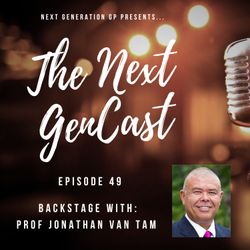
Episode 49: Backstage with Prof Sir Jonathan Van-Tam
57:51|In this episode, Professor Sir Jonathan Van-Tam, former Deputy Chief Medical Officer for England, shares his remarkable journey from a market town in Lincolnshire to the national stage during the COVID-19 pandemic.Known for his honesty, clarity, and trademark analogies, JVT reflects on his family’s extraordinary story, the challenges of breaking into medicine, and the pivotal choices that shaped his career in public health.He talks candidly about stepping into leadership “by accident,” managing the pressure of being thrust into the spotlight, and navigating the uneasy intersection of science and politics. Along the way, he opens up about imposter syndrome, the personal costs of public service, and the lessons he hopes will inspire the next generation of leaders.🕰️ Highlights02:00 – Early Life & Family Influence04:00 – Getting Into Medicine06:00 – Path to Public Health & Pharma12:00 – Becoming Deputy CMO17:00 – Thrust Into the Spotlight25:00 – Imposter Syndrome32:00 – Science, Politics & Pressure39:00 – The Power of Communication49:00 – Work-Life Balance & Personal Cost58:00 – Reflections & Legacy57:00 – Quickfire Round🔗 Links and resourcesSign up to our monthly bulletin to hear about more programmes, podcasts, events and opportunitiesFollow Nish on Twitter/X and LinkedIn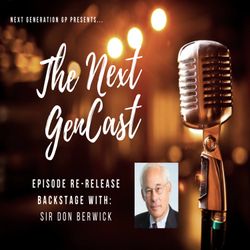
RE-RELEASE- Episode with Don Berwick
59:45|🎧 Re-releaseAs many of us take a well-earned pause over the summer, we’re revisiting one of our most popular and inspiring episodes: our conversation with the legendary Don Berwick. Whether you’re listening for the first time or returning to it with fresh ears, this episode is packed with wisdom on leadership, purpose, and finding joy in work.For the past 30 years, Donald Berwick has been one of the leading authorities and innovators of quality and improvement both in the U.S. healthcare system and in the NHS. A paediatrician by background, Don was for 19 years the founding CEO of the Institute for Healthcare Improvement (IHI).In 2010, he was appointed by President Barack Obama as the Administrator of the Centers for Medicare and Medicaid Services. He has served on the faculties of the Harvard Medical School and Harvard School of Public Health, has written over 160 articles and 6 books, and has provided trailblazing leadership to improve the ways health care providers and institutions care📝 Highlights:His leadership story to date (3 mins)Mentors (12 mins)Balancing clinical work with leadership and academia (16 mins)What it was like working for President Obama (19 mins)The job of a leader (24 mins)Coping with failure (27 mins)Handling criticism (33 mins)The future of the NHS (36 mins)Morale in primary care (41 mins)Finding joy in work (45 mins)Quick fire: including favourite books, his proudest moments, advice to his younger self, and top tips for new leaders (52 mins)📚 Resources:A Promise to Learn, A Commitment to Act – Berwick Review (2013)IHI Framework for Improving Joy in WorkBook: Ministry for the Future by Kim Stanley Robinson📱 Social Media:Follow @donberwick and @nishmanek📬 Stay in the loop!🔗 bit.ly/NGGPbulletin🌐 nextgenerationgp.co.uk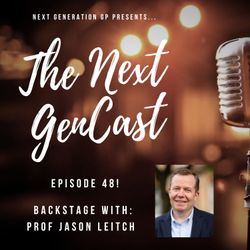
Episode 48: Backstage with Prof Jason Leitch, former National Clinical Director of the Scottish Government
01:00:59|Jason Leitch on Leadership, Public Trust & Fixing the HooverIn this powerful and personal episode, Professor Jason Leitch – former National Clinical Director of the Scottish Government – joins Dr. Nish Manek for an honest, insightful conversation on what it truly means to lead through crisis.From storytelling and the imposter syndrome to the pressure of daily COVID briefings, Jason reflects on his remarkable career and the lessons that still resonate today.Whether you're a healthcare leader, or simply curious about the human side of leadership – this one’s for you.🕰️ Timestamps & Highlights04:30 – Growing up in a working-class household: family, faith & humble roots08:00 – The early influences that shaped Jason’s values and work ethic09:30 – Being headhunted into government – and why he left surgery10:30 – The fellowship at Harvard & IHI that changed everything13:45 – Systems thinking, safety, and why fixing one jaw wasn’t enough17:00 – Creating the Scottish Patient Safety Programme – and saving lives20:00 – “Where are the clever people?” – the moment Jason realised he was in the room23:00 – What most people misunderstand about civil servants and politicians27:30 – Imposter syndrome in senior roles — and how to work with it30:00 – From dentist to national spokesperson: leading communication during COVID32:00 – Behind the scenes of daily press briefings with Nicola Sturgeon36:00 – The Grinch moment: “I cancelled Christmas in October”38:00 – Social media abuse, threats — and how he stayed grounded42:00 – Running, audiobooks, and the daily 5K: mental health strategies46:00 – Why being wrong publicly was part of the job48:00 – The monkey and the golf ball: Jason’s dad and the story that stuck51:00 – Full circle: why “fixing the Hoover” might be all the leadership advice you need53:00 – Biggest career mistake? Waiting too long to step beyond dentistry54:00 – Final reflections: don’t over-design your career. Build relationships. Fix the Hoover.🔗 Links and resourcesCatch up with Episode 25 with Don Berwick, Jason's role model and mentorSign up to our monthly bulletin to hear about more programmes, podcasts, events and opportunitiesFollow Nish on Twitter/X and LinkedIn
Episode 47: Backstage with Prof Sir Steve Powis, National Medical Director
01:07:14|In this landmark episode of the Next GenCast, Dr. Nish Manek sits down with Professor Sir Steve Powis, just weeks before he steps down as National Medical Director of the NHS in England after more than seven years in the role.This is not just an interview — it's an unfiltered, powerful reflection on leadership under pressure, told by the man who stood at the helm of the NHS during one of its most turbulent chapters: the COVID-19 pandemic.In a conversation recorded live at NHS Confed Expo in June 2025, Sir Steve opens up in a way few senior leaders ever do.He talks honestly about the terror of those early pandemic days, what it really felt like to stand at the podium during Downing Street press conferences, and the emotional toll of knowing the NHS could collapse under his watch.But this episode is about far more than crisis leadership. It’s a deeply personal insight into what makes a great leader — from the power of relationships and kindness to handling imposter syndrome at the very top. Sir Steve also shares the most important lessons he’s learned, what he hopes for the next generation of clinical leaders, and how he wants to be remembered.**Highlights03:00 – "I didn’t set out to be a leader"06:00 – “I caught the bug” – enjoying policy and strategy08:00 – Early mentors, first impressions, and learning to manage a unit11:00 – Becoming a Medical Director and then National Medical Director14:00 – The Simon Stevens sofa interview16:00 – Imposter syndrome, confidence, and doubt21:00 – Pandemic prep and the moment it became real26:00 – Behind the scenes at Downing Street press briefings30:00 – Media gaffe: “I didn’t hear the question…”32:00 – Communicating in a crisis: “You’re never speaking to just one audience”37:00 – The emotional toll and the moment that broke him43:00 – Watching The Repair Shop in tears48:00 – Working with politicians: “See the world through their eyes”52:00 – Legacy and pride: Royal Free, North Middlesex, and the NHS model59:00 – Quickfire round: cartography, Springsteen, and shoemaking1:03:00 – Final leadership advice: “Kindness. Patience. Relationship**Links and resources:Learn more about the Next Generation GP programmeSIgn up to our monthly bulletin to hear about more programmes, podcasts, events and opportunitiesFollow Nish on Twitter/X and LinkedInShare this episode with someone stepping into leadershipSubscribe and leave us a review — it really helps others find the show
Episode 46: Backstage with Prof Sir Chris Whitty
55:55|For this episode, I’m absolutely honoured to be joined by someone I've wanted to interview for a long time: Prof Sir Chris Whitty, Chief Medical Officer for England.Ever wondered about the man behind the podium—the calm, steady voice that guided the nation through one of its toughest times? Well, today, you get to hear his story.There’s so much more to him than what you’ve seen on screen. What drives someone to take on such an immense responsibility? What keeps them up at night when millions are watching their every move?In this conversation, we dive into his leadership journey— starting from his early days tackling public health issues broad, to facing unimaginable challenges on a global stage.We talk about the moments that shaped him, the lessons he learned from global health, and what it really takes to lead under pressure. There are a few surprising revelations, some moments of unexpected humour, and leadership insights you won’t want to miss.Whether you’re a seasoned leader, an aspiring one, or just curious about what it’s like to make decisions that impact millions, this episode is for you...*Highlights:2 mins - From Humble Beginnings: Early Career and Defining Moments8 mins - Lessons from Around the World: Global Health Insights15 mins - Leadership and Science: Navigating Complex Decisions22 mins - Crisis Management Up Close: Behind the Scenes29 mins - The Toughest Calls: Decisive Moments35 mins - Handling Public Pressure: Staying Steady42 mins - Owning Mistakes: Reflections and Learnings49 mins - Wisdom for Future Leaders*LinksFollow the CMO on Twitter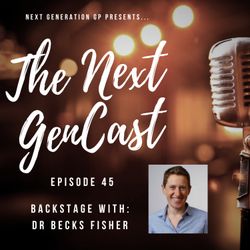
Episode 45: Backstage with Dr Becks Fisher
55:47|On today’s episode, I’m absolutely honoured to be joined by my dear friend, Dr Becks Fisher. Becks is a GP and the Director of Research and Policy at the Nuffield Trust—a hugely respected voice in UK health policy.Becks helped to co-found Next Gen GP nearly eight years ago, and she’s been a close friend and someone I’ve deeply admired ever since.In this conversation, Becks shares her journey from being a clinical fellow to becoming a national leader in healthcare policy. We talk about her passion for health equity, her reflections on the future of general practice, and the pivotal moments that have shaped her career.We also explore the role of mentorship, the challenges of balancing work and life, and some brilliant advice for GPs earlier in their careers.She’s not only an inspiring leader—but truly, just a thoroughly brilliant human being. I’m so proud to call her a friend, and I can’t wait for you to hear this episode...*Highlights:01:00 – Becks's Role at Nuffield Trust02:00 – Journey into the Think Tank World05:00 – Influence and Impact of Think Tanks08:00 – Challenges in Health Equity15:00 – Personal Leadership Journey19:00 – Advice for Aspiring Leaders23:00 – The Value of Fellowships26:00 – Building Networks and Mentorship35:00 – The Role of Media in Healthcare40:00 – Balancing Work and Life46:00 – The Future of General Practice*LinksFollow Becks on TwitterHarkness FellowshipBeck's recent Nuffield Trust paper on the Future of the Partnership Model*Recommendations:Book: Four Thousand WeeksBook: Dare to LeadPodcast episode: The Next GenCast Episode with Oliver Burkeman